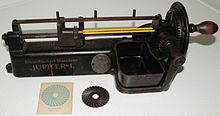Guhl & Harbeck
The company Guhl & Harbeck was founded on February 13, 1867 by Heinrich August Hermann Guhl and Christian Friedrich Harbeck in Hamburg .
As the son of a dentist, HAH Guhl demonstrated his skills as a mechanic and engineer in his parents' house right next to the town hall in Hamburg; CF Harbeck was a businessman.
The company Guhl & Harbeck initially developed and produced household appliances in small numbers. The first economic success came with the Guhl & Harbeck Original Express household sewing machine , which was extremely popular with domestic and foreign customers. The demand grew and the space was slowly becoming scarce, which is why the company moved to the nearby Raboisen in 1870 due to a lack of space. The factory building in Herrengraben Hamburg was erected in 1889. In 1900 the factory, which was still expanding, was relocated to Normannenstrasse.

In the meantime, production included the Original Express sewing machines , Normannia CB sewing machine , Normannia round gripper , Saxonia Regia , the Jupiter 0 and Jupiter 1 pencil sharpening machines , tubular metal tables , knife and fork cleaning machines with the name Blanca , the Pipifax knife sharpening machine as well as bicycles, lamps and other items.
The first Hammonia typewriter , invented and manufactured in Germany, was presented to the world in 1882. The “new Kosmopolit patent typewriter” was added later.
Harbeck died in 1899. From this point on, Heinrich August Hermann Guhl was the sole owner. Guhl had nine children, five of them sons. The oldest, Christian Emil Hermann Guhl, married the daughter Karl Junkers, the founder of the sewing machine factory Junker und Ruh in Karlsruhe. In 1903 Christian Emil Hermann Guhl joined the Junker und Ruh company. In 1911 he left Guhl & Harbeck. In 1904, when Heinrich August Hermann Guhl was 62 years old, Richard Guhl and later Martin Guhl and Hans Guhl joined the company Guhl & Harbeck. This was transformed into a general partnership.
In 1927 Richard and Hans Guhl left the company. Martin Guhl continued to run the company alone, which soon ran into economic problems. The world economic crisis could not be overcome. On October 31, 1930, the company was declared lapsed for the first time after concluding a settlement procedure. In Normannenstrasse, however, production continued under Martin Guhl, who was killed in a bomb attack on the plant when Hamburg was destroyed in 1943. After the war, the company experienced a renaissance: The founder's grandson, Robert Karl Eduard Guhl, tried to revive the old Hamburg company with the production of letter openers, Jupiter pencil sharpeners and other office accessories, albeit with moderate success. On January 22, 1970, the Guhl and Harbeck company went out for the second time.
literature
- Prof. Rainer Guhl, Jan Guhl: Family history Guhl
- Clau-Peter Soelter: 100 years of company history: Guhl & Harbeck, Hamburg. In: International Forum Historische Bürowelt eV (Ed.): Historische Bürowelt, 15 (1996), issue 46, pp. 11-17.
Web links
- Jens Meyer-Odewald: About machines that made history. In: The world . May 14, 2014
Individual evidence
- ^ Leonhard Dingwerth: Small pencil sharpener: History and description of historical pencil sharpeners . Art graphics Dingwerth, 2008, ISBN 978-3-921913-37-6 , p. 76-77 .
- ^ Leonhard Dingwerth: The history of the German typewriter factories . tape 2 : Medium and small manufacturers . Art graphics Dingwerth, 2008, ISBN 978-3-921913-39-0 , p. 157-158 .
- ^ H. Brill: trade sheet for the Grand Duchy of Hesse . tape 56 , 1893, pp. 106 .
